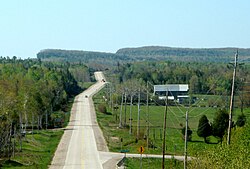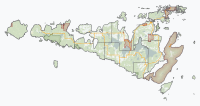This article needs additional citations for verification. (February 2012) |
Northeastern Manitoulin and the Islands is a municipality with town status in Manitoulin District in Northeastern Ontario, Canada, approximately 30 kilometres (19 mi) south of Espanola. Its main town is Little Current, located on the northeast side of Manitoulin Island. However, its territory also includes most of the small islands surrounding Manitoulin, even those at the far western end of Manitoulin.
Northeastern Manitoulin and the Islands | |
|---|---|
| Town of Northeastern Manitoulin and the Islands | |
 | |
| Coordinates: 45°58′N 81°56′W / 45.967°N 81.933°W | |
| Country | Canada |
| Province | Ontario |
| District | Manitoulin |
| Established | January 1, 1998 |
| Government | |
| • Type | Town |
| • Mayor | Alan MacNevin |
| • MP | Carol Hughes (NDP) |
| • MPP | Michael Mantha (NDP) |
| Area | |
| • Land | 495.68 km2 (191.38 sq mi) |
| Population (2011)[1] | |
• Total | 2,706 |
| • Density | 5.5/km2 (14/sq mi) |
| Time zone | UTC-5 (EST) |
| • Summer (DST) | UTC-4 (EDT) |
| Postal code | P0P 1K0 |
| Area code | 705 |
| Highways | |
| Website | www.townofnemi.on.ca |
The town was created on January 1, 1998, by amalgamating the Town of Little Current with the Township of Howland and the unorganized small islands in Lake Huron.
It is the administrative headquarters of the Aundeck Omni Kaning First Nations band government.[1]
Communities
editLittle Current is the largest community within the town, as well as its administrative centre. Formerly an independent town, Little Current was named variously by different groups for the swift strong currents of water running between the narrow passageway which connects the North Channel and Georgian Bay. Past names for the community included Waebijewung, Le Petit Courant and Shaftesbury.
The town also includes the smaller communities of Cold Springs, Dinner Point Depot, Eads Bush, Green Bay, Honora, Rockville, and Sheguiandah.
Economy
editIn the late 19th century lake vessels stopped here to take on wood for fuel. A settlement developed, with George Abotossaway, an Anishinaabe man, selling fuel to the steamers. The westbound passengers on board the vessels were usually from Upper Canada. One group included the Turner family which disembarked and, being merchants, set up a general store still in business today.
The lumbering trade was foremost in the region at the time and saw mills were established at nearby Low Island, now a park in the community. Settlers cleared the land for farming.
Today the local economy continues to include farming and lumbering but tourism is a main aspect.
Transportation
editBeing a safe haven from the ravages of Lake Huron, the community may be found on Canadian Hydrographic Chart #2205. It is well marked from the east by Strawberry Island Lighthouse and from the west by a series of navigational markers.
The only land access to Manitoulin is the Little Current Swing Bridge, located on Highway 6, crossing the North Channel of Lake Huron to the mainland, where the highway continues northward to Espanola. In summer the swing bridge opens to marine traffic on the hour for 15 minutes from sunrise to sunset, delaying road traffic.
Historically, Little Current was the western terminus of the Algoma Eastern Railway before the AER's acquisition by the Canadian Pacific Railway. After acquisition, the portion from McKerrow to Little Current was designated as the Little Current subdivision of the CPR, and became a spur of its Sault Ste. Marie line. Passenger rail ridership through Espanola and Little Current continued for some time due to the relatively difficult road access to the island, but passenger operations along the spur ended in 1963, and the line became an infrequently-used "ghost railway". Over the following decades, the CPR gradually removed sections of the track: in the 1980s, the section connecting Goat Island to Manitoulin Island across the Little Current Swing Bridge (which was converted to service road traffic only), and in the 1990s, the section connecting Espanola to Goat Island. Currently only a small portion of the track still exists, which connects the Domtar pulp and paper mill in Espanola to the CPR line using the junction at McKerrow; this stretch of track is the only surviving remnant of the AER.[2]
In April 2018, Ontario Northland announced that it would begin bus service on Manitoulin Island, with buses stopping at Little Current upon arrival from Sudbury before travelling around the island using a circular route. The new route also includes Sheguiandah. This new route marked the first time the island had seen bus service in decades.[3] Manitoulin Island service ended in 2019.[4]
Climate
editThe climate is characterized by warm, humid summers (sometimes rainy/cooler) and snowy, rigorous winters. The cold season does not have many differences with other North American places of the same parallel. However, the obvious differing factor is that all weather is dictated by Lake Huron. As such, the lake generates microclimates similar to coastal cities, thousands of miles away; one example is Asahikawa, on the northern Japanese island of Hokkaido.[5][6][7][8]
| Climate data for Little Current, 1981-2010 normals | |||||||||||||
|---|---|---|---|---|---|---|---|---|---|---|---|---|---|
| Month | Jan | Feb | Mar | Apr | May | Jun | Jul | Aug | Sep | Oct | Nov | Dec | Year |
| Record high °C (°F) | 8 (46) |
10 (50) |
19 (66) |
27 (81) |
29 (84) |
33 (91) |
36 (97) |
36 (97) |
31 (88) |
23 (73) |
18 (64) |
13 (55) |
36 (97) |
| Mean daily maximum °C (°F) | −5.9 (21.4) |
−3.8 (25.2) |
1.5 (34.7) |
10.3 (50.5) |
17.7 (63.9) |
22.5 (72.5) |
25.1 (77.2) |
24.1 (75.4) |
18.7 (65.7) |
11.7 (53.1) |
3.6 (38.5) |
−2.9 (26.8) |
10.2 (50.4) |
| Mean daily minimum °C (°F) | −16.7 (1.9) |
−15.6 (3.9) |
−10.5 (13.1) |
−1.5 (29.3) |
4.0 (39.2) |
8.9 (48.0) |
11.9 (53.4) |
11.0 (51.8) |
7.0 (44.6) |
1.9 (35.4) |
−4.1 (24.6) |
−11.9 (10.6) |
−1.3 (29.7) |
| Record low °C (°F) | −41 (−42) |
−41 (−42) |
−32 (−26) |
−15 (5) |
−5 (23) |
−1 (30) |
2 (36) |
0 (32) |
−7 (19) |
−8 (18) |
−29 (−20) |
−38 (−36) |
−41 (−42) |
| Source: Environment Canada, The Weather Network | |||||||||||||
Culture
editEach year the town hosts "Haweater Weekend," a weeklong celebration which takes its name from the Haweaters, the name given to one who is born on Manitoulin Island. The main celebrations take place on the first weekend of August, and include a fireworks display, a video dance, street vendors, and a parade.
The prominent American sportsman John W. Galbreath (1897-1988), owner of the Pittsburgh Pirates Major League Baseball club as well as the Darby Dan Farm thoroughbred horse racing operation, owned a summer retreat here and named one of his horses after the village. Little Current won the 1974 Preakness and Belmont Stakes and was voted that year's United States Champion 3-Yr-Old Colt.
Media
editRadio
editThe town has two radio stations, CFRM and CHAW. Some radio stations from Sudbury can also be heard in the area, as can Elliot Lake's CKNR.
| Frequency | Call sign | Branding | Format | Owner | Notes |
|---|---|---|---|---|---|
| FM 94.1 | CKNR-FM | Moose FM | Adult contemporary | Vista Broadcast Group | |
| FM 97.5 | CBCE-FM | CBC Radio One | Talk radio, public radio | Canadian Broadcasting Corporation | Rebroadcaster of CBCS-FM Sudbury |
| FM 100.7 | CFRM-FM | Hits 100 | Community radio/adult hits | Manitoulin Radio Communication | |
| FM 102.1 | CJTK-FM-2 | KFM | Christian music | Harvest Ministries Sudbury | Rebroadcaster of CJTK-FM Sudbury |
| FM 103.1 | CHAW-FM | Country 103 | Country music | Manitoulin Radio Communication |
Newspaper
editThe town's primary community newspaper is the weekly Manitoulin Expositor,[9] which is the oldest still-extant newspaper in Northern Ontario.[10]
Demographics
editIn the 2021 Census of Population conducted by Statistics Canada, Northeastern Manitoulin and the Islands had a population of 2,641 living in 1,205 of its 1,903 total private dwellings, a change of -2.6% from its 2016 population of 2,712. With a land area of 489.19 km2 (188.88 sq mi), it had a population density of 5.4/km2 (14.0/sq mi) in 2021.[11]
| 2021 | 2011 | |
|---|---|---|
| Population | 2,641 (-2.6% from 2016) | 2706 (-0.2% from 2006) |
| Land area | 489.19 km2 (188.88 sq mi) | 495.68 km2 (191.38 sq mi) |
| Population density | 5.4/km2 (14/sq mi) | 5.5/km2 (14/sq mi) |
| Median age | 55.6 (M: 55.6, F: 56) | |
| Private dwellings | 1,205 (total) | 2029 (total) |
| Median household income |
See also
editReferences
edit- ^ "Home". aundeckomnikaningfn.com.
- ^ Saarinen, Oiva W. (April 2013). From Meteorite Impact to Constellation City: A Historical Geography of Greater Sudbury. Waterloo, ON: Wilfrid Laurier University Press. ISBN 9781554588374.
- ^ "Ontario Northland Introduces Bus Service to Manitoulin Island". Archived from the original on 2019-07-04. Retrieved 2019-07-04.
- ^ "Ontario Northland ends Manitoulin bus service Friday". 13 November 2019.
- ^ "Little Current, Ontario Travel Weather Averages (Weatherbase)". Weatherbase. Retrieved 2019-03-10.
- ^ "Asahikawa, Japan Travel Weather Averages (Weatherbase)". Weatherbase. Retrieved 2019-03-10.
- ^ Black River Channel Maintenance Operations of the Federal Navigation Channels, Negative Declaration and EA. 1979.
- ^ "O clima típico de qualquer lugar da Terra - Weather Spark". pt.weatherspark.com. Retrieved 2019-03-10.
- ^ Jim Moodie, "Looking back fondly on days at the Expositor". Sudbury Star, August 10, 1999.
- ^ Jim Moodie, "The island's two weekly papers become one". Sudbury Star, March 20, 2001.
- ^ "Population and dwelling counts: Canada, provinces and territories, census divisions and census subdivisions (municipalities), Ontario". Statistics Canada. February 9, 2022. Retrieved March 30, 2022.
- ^ "2021 Community Profiles". 2021 Canadian census. Statistics Canada. February 4, 2022. Retrieved 2022-04-27.
- ^ "2011 Community Profiles". 2011 Canadian census. Statistics Canada. March 21, 2019. Retrieved 2012-02-22.
- ^ "2006 Community Profiles". 2006 Canadian census. Statistics Canada. August 20, 2019.
- ^ "2001 Community Profiles". 2001 Canadian census. Statistics Canada. July 18, 2021.

